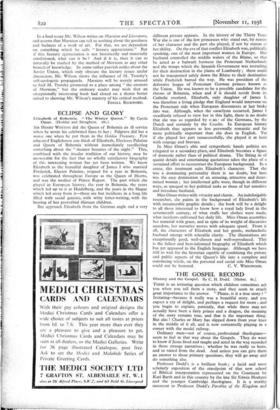ECLIPSE AND GLORY
SIR HENRY WorroN did the Queen of Bohemia an ill service when he wrote his celebrated lines to her; Palgrave did her a worse one when he put them in the Golden Treasury. Few educated Englishmen can think of Elizabeth, Electress Palatine and Queen of Bohemia without immediately recollecting something about the "meaner beauties of the night." This, combined with the insular tradition of our history, may be answerable for the fact that no wholly satisfactory biography of this interesting woman has yet been written. We know Elizabeth as the beautiful daughter of James I who married Frederick, Elector Palatine, reigned for a year in Bohemia, was celebrated throughout Europe as the Queen of Hearts, and was the mother of Prince Rupert. The part which she played in European history, the year in Bohemia, the years which led up to it at Heidelberg, and the years in the Hague which led away from it—these are but incidents in a long.life filled with social gaieties, with witty letter-writing, with the bearing of her proverbial thirteen children.
But approach Elizabeth from the German angle and a very
different picture appears. In the history of the Thirty Years War she is one of the few princesses who stand out, by reason of her character and the part she played, if not by reason of her ability. On the eve of that conflict Elizabeth was, politically speaking, one of the most important women in Europe. Her husband controlled the middle waters of the Rhine, so that he acted as a bulwark _between the Protestant Netherlands and the troops which the Spanish Government was recruiting for their destruction in the plains of Lombardy; these could not be transported safely down the Rhine to their destination while Frederick barred the way. He was president of the defensive league of Protestant German princes known as the Union. He was known to be a possible candidate for the throne of Bohemia, when and if it should revolt from its Catholic overlord. Elizabeth, only daughter of James I, was therefore a living pledge that England would intervene on the Protestant side when European discontents at last broke into war. Although, when the cataclysm occurred, James I steadfastly refused to view her in this light, there is no doubt that she was so regarded by rr an/ of the Germans, by the Dutch and certainly by the Czechs. In European history Elizabeth thus appears as less personally romantic and far more politically important than she does in English. Yet if she played her part unsuccessfully, she played it at least with courage and bravura. In Miss Oman's able and sympathetic hands politics are relegated to a secondary place, and Elizabeth becomes a figure of domestic rather than of political drama. The fitting in of quaint details and entertaining quotations takes the place of a sustained effort to reconstruct the European background. In a sense, this treatment suits Elizabeth's character. That she was a dominating personality there is no doubt, but hers was the easy domination of an amusing, attractive and deter- mined woman; her intellectual gifts were, though in different ways, as unequal to her political tasks as those of her sensitive and irresolute husband.
Miss Oman writes with vivacity and charm. An indefatigable researcher, she paints in the background of Elizabeth's life with innumerable graphic details; the book will be a delight to all those interested to know how a royal lady lived in the seventeenth century, of what stuffs her clothes were made, what incidents enlivened her daily life. Miss Oman assembles her material with grace, and in spite of its weight of discursive anecdote, her narrative moves with adequate speed. From it all, the characters of Elizabeth and her gentle, melancholic husband emerge with tolerable clarity. . The illustrations are exceptionally good, well-chosen and well-reproduced. This is the fullest and best-informed biography of Elizabeth which has yet appeared in the English language. Although we have still to wait for the historian capable of combining the private and public aspects of the Queen's life into a complete and convincing whole, on the personal and social side Miss Oman










































 Previous page
Previous page